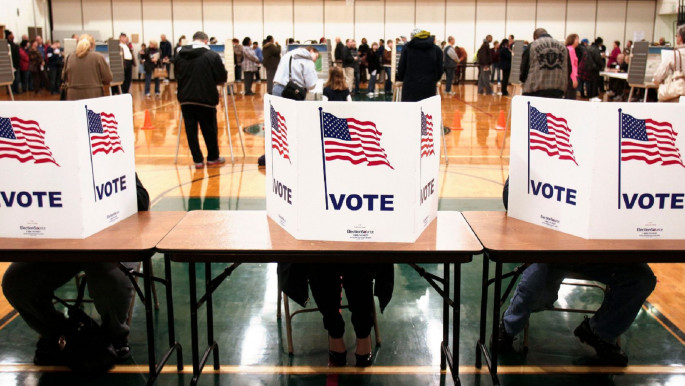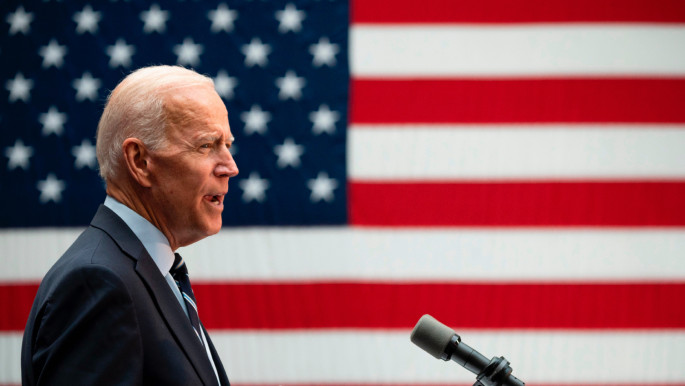US election 2020: What's at stake for Palestine?
The upcoming presidential elections in the United States are historic and life-changing, no matter where you are positioned on the US political spectrum.
This is equally true for peoples and governments around the world, as the dynamics of international relations have been fundamentally altered and disrupted by the Trump presidency.
While Trump allies in the US and around the world, including Israel and some Gulf States, are hoping he could be re-elected, the view from Palestine is fundamentally different, and the stakes are much higher.
For Palestinians, Donald Trump's policy towards their cause has been characterised by cruelty and outright hostility. His maximum pressure approach has brought the Palestinian polity to its financial knees and devastated basic health and education services to millions of Palestine refugees, with the cutting of funding to UNRWA and civil society through USAID and other US aid programs.
Politically, the past four years have done strategic damage to the Palestinian cause that will be difficult to mend.
The Trump administration discarded decades of international consensus on the Palestine Question and instead adopted the right-wing maximalist Israeli position of taking over the maximum amount of Palestinian land with the minimum amount of Palestinians, all while denying the Palestinian people even the possibility of realising sovereignty in a state of their own.
 |
Politically, the past four years have done strategic damage to the Palestinian cause that will be difficult to mend |  |
The so-called Trump plan legitimised the crime of annexation, including of Jerusalem. It also endorsed a fanatical biblical ideological worldview of the conflict that discards the Palestinian people, their rights, and their plight as an expendable nuisance.
Instead, it focused the proposed "solution" on promises of improving Palestinian living standards in exchange for full abdication of political, social, and national rights and surrender to permanent hegemonic Israeli control.
 |
|
| Read more: Israel normalisation deals reflect the rupture between repressive regimes and Arab societies |
Concurrently, the Trump administration's confrontational approach to international politics and Donald Trump's readiness to lash out at traditional allies resulted in the new status quo of international and multilateral politics: paralysis.
The Trump administration breathed life into unilateralism and encouraged right-wing state leaders around the world to advance this worldview, offering their controversial policies political cover.
For Palestine, that meant the international system on which Palestinian diplomatic work relies was disabled. For four years, the international community was unwilling to defend the body of international consensus, resolutions, and visions for a solution with anything beyond rhetorical platitudes. The damage was strategic.
The cherry on top was the Trump administration's aggressive push for Arab-Israeli normalisation to further marginalise the Palestinian issue. The UAE and Bahrain signed agreements in the summer that opened the way for increased arms sales to the benefit of the US economy.
It also advanced the goal of positioning Israel as the military, economic, and scientific superpower of the region with Arab states as satellites flying in its orbit. Last week, Sudan became the latest Arab nation to recognise Israel.
 |
The Trump administration discarded decades of international consensus on the Palestine Question and instead adopted a right-wing maximalist Israeli position |  |
The deals allowed Israeli Prime Minister Benjamin Netanyahu to boast that he achieved "peace" for peace without compromising on his domestic commitment to expand illegal settlements and enact annexation, whether de facto or de jure.
The Trump administration is reportedly intent on adding more of these 'victories' to its score board with the Evangelical and right-wing Jewish base. Reports indicate that the administration is pressuring, cajoling, and/or enticing other Arab states to normalise with Israel, including Morocco, while Saudi Arabia seems to prefer refraining from joining the normalisation parade for now.
So, it is no surprise that Palestinians do not want Donald Trump to win in upcoming elections. An emboldened Trump will be crushing for them.
But the Biden-Harris ticket does not offer the kind of fundamental change the Palestinians need in US policy. At best, a Biden administration will revert to the status quo ante of American policy, which appeased Israel, shielded it from accountability, and maintained good security contacts with the Palestinian side without advancing Palestinian rights.
 |
|
| Explainer: Why is the Arab American vote so important in the 2020 US election? |
Instead of the runaway train of Trump politics, Palestinians will get a train going nowhere. Only this train will still manage to damage what's left of the tracks, pollute the environment, and leave a train-load of passengers boiling with frustration.
Joe Biden is not unknown to Palestinians. In addition to having dealt with him during eight years of the Obama administration, Biden has a long and established track record, dating back to the early 1970s, on Israel/Palestine that is not exactly flattering precisely because it is anchored in this false balance of placating Israel, shielding it from accountability, and providing it with military aid while professing support for the two-state formula.
This was evident when Biden personally intervened to ensure that the Democratic Party platform of 2020 does not mention or reference Israeli occupation. For Biden, supporting Palestinian rights was never worth the possible domestic backlash and there are no signs of this position changing despite the significant changes within the base of the Democratic Party.
Another dimension that is often overlooked in US Presidential election cycles is Congress. This year, American voters will be deciding the fate of 470 Congress seats, including 35 Senate seats. The Senate, currently controlled by the Republicans, could change hands to Democrats whose control of the House doesn't seem to face serious challenge.
 |
Instead of the runaway train of Trump politics, Palestinians will get a train going nowhere |
 |
For Palestinians, a Democratic majority in the Senate would not have a fundamental effect on that body's staunchly pro-Israel bipartisan positions, nor would it promise a more supportive position on Palestinian rights.
Legislation like the Taylor Force Act and resolutions against the Boycott, Divestment, and Sanctions (BDS) campaign will still enjoy wide bipartisan support and are legislations Biden has promised to abide by regardless the implications on US-Palestinian relations or the civil rights of Americans for that matter.
 |
|
| Read more: What a Biden presidency could mean for the Middle East |
What is of long-term interest to Palestinians is the increasing number of progressive candidates challenging the status quo in the Democratic Party and defending Palestinian rights without fear or reservations.
The more progressive members like Alexandria Ocasio-Cortez, Ilhan Omar, Rashida Tlaib, Ro Khanna, Bernie Sanders and others are elected to Congress, the more opportunities Palestinians will have for a levelled conversation about policies based on principles and rights, including their rights to life, dignity, and freedom from Israeli occupation.
To put it bluntly, Palestinians would prefer to see anyone in the White House rather than Donald Trump. While some in Palestinian political circles have expressed unrealistic optimism about a Biden administration, the reality is that undoing the havoc Trump has wreaked in Palestine/Israel will take time, effort, and political capital Biden might not be interested in spending while facing a devastating pandemic and an economic crisis domestically.
Even if a Biden administration has such drive to engage vigorously in resolving the conflict, the political scene in Israel is too entrenched in the right-wing, anti-Palestinian state, anti-Palestinian rights camp to give in without serious pressure Biden has already said he will not use.
A Biden win will be welcomed not because it will offer hope, change, or relief. Rather, it will at the very least give Palestinians the time they need to breathe, regroup, and heal from the battering of the past four years.
Nour Odeh is a political analyst and public diplomacy consultant. A former award-winning journalist, Odeh was also Palestine's first female government spokesperson
Follow her on Twitter: @nour_odeh



